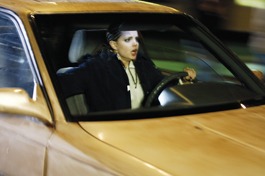home | metro silicon valley index | movies | current reviews | film review

ROAD WORRIER: Mena Suvari should have taken the bus in 'Stuck.'
Shattered
Stuart Gordon's horrifyingly funny 'Stuck' gives audiences that run-down feeling
By Richard von Busack
THE "inspired by a true story" title on Stuart Gordon's film Stuck may seem like the old bull again. "A true story," eh? So was Fargo. About 20 minutes through Gordon's grisly but invigorating horror comedy, the shock of recognition hits: "Oh, that true story."
Gordon spins off his Rhode Island–based tale from an account of a real-life unfortunate named Chante Mallard, who drove herself into history in Fort Worth, Texas, October 2001. Like Crash, Gordon's film investigates the way two lives intersect by chance. Unlike Crash (and all its many, many knockoffs, especially Reservation Road, to which this film serves as a delightful anecdote), no one in Stuck acts in a particularly implausible manner. Immoral, yes, implausible, no. The film is piloted by a filmmaker with a social scientist's interest in how worse comes to worst.
Mena Suvari plays an old-folks-home nurse named Brandi (and yes, she does sign her name with a little heart dotting the "i"). Gordon observes her patience and gentleness at her sometimes literally shitty workplace. Forced into a Saturday shift by her boss, Brandi decides to make the most of Friday night. She goes out to a disco with her pal Tanya (Rukiya Bernard) and her muscly boyfriend, Rashid (Russell Hornsby).
Meanwhile, across town, Tom (Stephen Rea, really good here) has joined the ever-growing ranks of the homeless. Kicked out of his transient hotel, he must wander the streets. He is crossing one of those streets early in the morning when Brandi, with a head full of Ecstasy and booze, crosses his path at 40 miles an hour.
Knocked out, thrust halfway through her windshield, immobilized with a compound fracture in his leg, Tom is driven home and hidden in Brandi's garage. She is panicked, but Rashid arrives with a six-pack, and the two end up drinking and making love. When dawn comes, Brandi has to head back to work in a taxi or else lose the promotion her boss is dangling over her head. Meanwhile, Tom, in one of those classic man-vs.-nature setups your high school English teacher told you about, has to pull himself out of the windshield by centimeters.
Gordon, still best known for his intoxicating 1985 horror comedy Re-Animator, hasn't lost his touch for humorous ultragore. The supreme gross-out, an incident with a too-friendly Pomeranian dog, is as hysterical as the famous shot in Yojimbo of the dog carrying a human hand its mouth. The hand-held camera is smoother than usual in today's films. The slight shake of the image doesn't exist merely to call attention to its avant-garde cred.
Suvari has never been better. Transformed by her tight cornrow braids, her big forehead looks as truculent as Condi Rice's. While the plot sounds like material for John Waters, Suvari is not playing comically stereotyped white trash. Apparently, the real Mallard is African American. It seems as if Gordon is referencing this aspect of the true-life story by having Brandi be in between the races, with a traditionally black hairstyle, a black boyfriend and a black best friend. By underscoring the stressful workplace and by the color-blind casting, Gordon puts the blame for the Mallard case where it belongs: not on race but on class.
This tragic-comedy of blood gets off on the right foot from the beginning, when Gordon tours the old-folks home; we have seen a lot of medicated oldsters in the movies lately, from Young@Heart to Mister Lonely, and this tour proves the most interesting. The old faces aren't blank; the inmates look like they're up to something, perhaps planning a break for it. And Gordon does a thoroughly amusing tease for the film's fine sex scene, lingering discreetly outside the waxy globes simmering in a lava lamp before zeroing in to expose the whole tableau.
Gordon, however, faces the problem of trying to satisfy both the gore audience and people who would like something a little more redeeming. The former want crazy Jacobean revenge, and that's what they get, although it is tinged with a sense of horror and waste. The latter audience might prefer the triumph of better angels. Certainly, Gordon shows there are better angels out there, when a helpful homeless man tucks Tom in on a park bench during his first night on the street. (The more experienced homeless man leaves with an ambiguous blessing: "Never say no to something that's free. It's really easy, because nothing is really free.")
Rashid, who turns out to be less violent than he sounds, might have guided the way to sanity. But the attitude of moral decay from the top down makes this kind of situation all too believable. Gordon's decision to retell the incident as a sick joke is a shrewd, yet never unfeeling, angle on true-life horror. What can you expect? You hear that things are worse in Mexico City, the metropolis of the future, where the run-over are sometimes backed up over and dispatched, just so that the police don't turn up and cause a stink. Rashid sums up our own landscape: "Anybody can do anything and get away with it. I mean, look at the White House."
![]() STUCK (R; 85 min.), directed by Stuart Gordon, written by Gordon and John Strysik, photographed by Denis Maloney and starring Mena Suvari, opens June 6 in San Francisco and Berkeley, and June 13 in San Jose.
STUCK (R; 85 min.), directed by Stuart Gordon, written by Gordon and John Strysik, photographed by Denis Maloney and starring Mena Suvari, opens June 6 in San Francisco and Berkeley, and June 13 in San Jose.
Send a letter to the editor about this story.
|
|
|
|
|
|